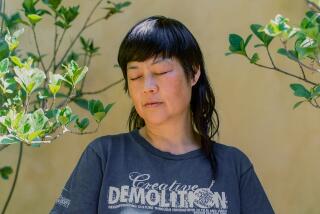‘Wetlands’ by Charlotte Roche
Wetlands
A Novel
Charlotte Roche, translated from the German by Tim Mohr
Grove Press: 230 pp. $17.95
It is easy to be put off by the hype surrounding this novel. The author, Charlotte Roche, is a television personality in Germany, host of an MTV-type show. She is young, attractive, and, obvious from her many fan-produced YouTube videos, very popular.
“Wetlands” is her first book. Open it at random and read a page and you cannot help but blush. It seems she wrote it to be outrageous. At worst you think she intends to shock and disgust; at best to get people, particularly women, to talk about taboo subjects. “Wetlands” is shocking. And it is disgusting. It plays on our every prurient tendency. But if you can get past the rushing torrent of vaginal secretions, pus, fecal matter and menstrual blood, there is an affecting story of a sad and incredibly lonely girl.
If you can get past it. First, you have to dive into that filthy concoction. And roll around in it. The 18-year-old narrator, Helen Memel, is in the hospital recuperating from an operation to remove an anal lesion. How did she get this lesion? What was it like? We get the play-by-play for her poor little posterior, both the events leading up to the lesion and every moment after the operation including the male nurse agreeing to take digital photos of the result and the doctor bringing in a plastic baggy of the detritus he removed. While she is stuck in bed, unable to leave until she has a bowel movement, Helen keeps herself occupied reminiscing about her exploits.
Women and their rear ends are not a new subject. Former ballet dancer Toni Bentley wrote “The Surrender” in 2004, her memoir about sodomy that was appalling in a different and, frankly, less interesting way. Back in 1965, Norman Mailer in “An American Dream” devotes at least a chapter to the subject in a celebration and embrace of the scandalous. But young Helen, though she speaks with bravado and pretends nothing she does is a big deal, really wants to challenge us and force us to question our beliefs. The book begins as if Helen is making fun of us, putting us down for our prudish attention to hygiene. She has no qualms about public bathrooms, the toilet seats or even the floors, and she is proud that she rarely bathes. “Obviously that means I never wash my face either. I think it’s overrated anyway.” Everything she does is a test to see whether the old wives’ tales are true and if bacterium is really such a terrible thing. Evidently cleanliness for health is a myth, because other than her unusual condition, she is incredibly hearty and resilient.
There is a lot of talk about this novel being a manifesto on the female body and sexuality, an updated and 21st century “Fear of Flying.” Helen is open and adventurous and willing to explore any new avenue -- so to speak -- and she revels in her desire and need for gratification. Certainly, she has no fear of discussing her body and asking for what she wants. There is nothing coy or cute about her, not with the men and women she hooks up with, or the doctors and nurses she deals with during her hospital stay. She is admirably tough and funny. She has a quick, dirty mind, yet somehow or other she seems oddly naïve and very sweet. Helen is also deeply troubled. As soon as she turned 18, she had herself sterilized. She wants to stay in the hospital because she hopes her divorced parents will accidentally visit at the same time and magically recognize they still love each other.
In drips and oozes, her real story emerges. She is the completely neglected child of two repressed and depressed people. She doesn’t know what her father does for work. She has memories she does not trust and a recurring vision of an event that could not have occurred. Or did it? No one in her family communicates -- even when they visit. It soon becomes apparent that Helen is so desperately into her bodily functions and pleasures because no one else -- not a lover and definitely not her mother or father -- is actually interested in her. She tells herself, “Give it up, Helen. You’re an adult now. You have to make your own way.” In the end, no pun intended, she makes an interesting choice that works out better than anyone would expect. Helen may make it after all.
Let’s face it; who of us hasn’t checked the tissue after a sneeze, peered into the toilet bowl, picked at a scab to see what was underneath? We all do it. We just don’t talk about it. Charlotte Roche has written an uncomfortable, blunt treatise on a young woman’s remarkable exploration of her body and its juices. It is a slimy swim, but one worth taking.
Wagman is the author of the novels “Skin Deep,” “Spontaneous” and “Bump.”
More to Read
The biggest entertainment stories
Get our big stories about Hollywood, film, television, music, arts, culture and more right in your inbox as soon as they publish.
You may occasionally receive promotional content from the Los Angeles Times.










